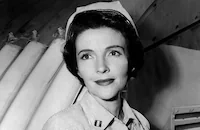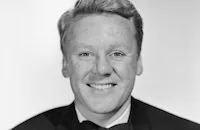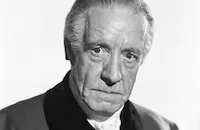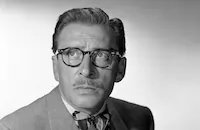It's a Big Country: An American Anthology

Brief Synopsis
Cast & Crew
Ethel Barrymore
Keefe Brasselle
Gary Cooper
Nancy Reagan
Van Johnson
Gene Kelly
Film Details
Technical Specs

Synopsis
On a transcontinental train, a talkative traveler takes the seat next to a professor reading a book. The talkative man interrupts the professor with his continual boasting about how wonderful America is, until the professor asks, "Which America?" To the other man's befuddlement, the professor explains there are many kinds of America and that they are all changing. He mentions the political and historical America, the country as part of the world community, and the American personality, which includes immigrants and the American Indians. This quiets the talkative man, and in the dining room, when an elderly woman says she is proud to be a part of America, he asks, "Lady, which America?"
In Boston, Mrs. Brian O'Riordan, an elderly Irish American living in a modest house dwarfed among skyscrapers, is disturbed after reading in the newspaper that the 1950 census has been completed, and she realizes that she has not been counted. She takes a bus to see the managing editor of the newspaper, Mr. Callaghan, and complains that she is seventy-four, and that the next census will not be for another ten years. Callaghan takes her name and address, then sends reporter Michael Fisher to pose as a census official and get a human interest story from her, but Mrs. O'Riordan recognizes Fisher from the newsroom and reprimands him. Callaghan now sincerely tries to help, calling a number of census bureau officials, but they refuse to offer assistance. Indignant, he calls connections at Congress and the White House, and drives with Fisher to Mrs. O'Riordon's home with flowers to apologize. A man from the census bureau then arrives, saying his office received a call from Washington. The census taker becomes impatient when Mrs. O'Riordan is long-winded in answering the questions, but Callaghan, enjoying the bureaucrat's discomfort, advises her to answer in her own way, as they have all afternoon.
African-American military and civilian leaders are shown and lauded; persons shown include Brigadier General Benjamin O'Davis; his son, Lt. Col. Benjamin Davis; Jackie Robinson; Jesse Owens; Joe Louis; Sugar Ray Robinson; Levi Jackson; Lena Horne; the Perry Brothers; Marian Anderson; Ethel Waters; Duke Ellington; Louis Armstrong; Eddie Anderson; Justice Francis Rivers of the City Court of New York; Judge Jane Bowland of the New York Court of Domestic Relations; noted radiologist Dr. Benjamin W. Anthony; Congressman Adam Clayton Powell, Jr.; the Right Reverend Bravid Harris; Irvin Molleson, appointed to the Federal Bench; Pauly Murray, former deputy attorney general of California; architect Paul Williams; the 1946 mother of the year, Mrs. Irma Clement; Dr. Ralph Bunche; and the late George W. Carver. A statue of Booker T. Washington is shown.
Hungarian-American Stefan Szabo raises a family of six daughters while running a company that produces "Szabo's Best U.S. Hungarian Paprika." On the first day of summer, he complains that he will have no peace until his daughters marry. They respond that only that week he turned down proposals from five suitors for Rosa, the eldest, as he was unhappy with the "Smiths, Cohens and O'Rileys" who pursue her. He reserves his greatest dislike for Greeks, because, he says, Hungarians have hated Greeks for 500 years. As Rosa walks to the bus to go to business college, Icarus Xenophon pulls up his car alongside her, and they fall in love at first sight. He offers her a job and drives her to school, and she tells him that her father is afraid she will fall in love before she marries, which Hungarian girls are not allowed to do. Icarus confesses that he has never been in love before, and by the time they reach school, he proposes. When he shows her his confectionary store, he reveals he is Greek, and she says she cannot marry him because Hungarians, especially her father, hate Greeks. He convinces her, however, to stay and work for him. As she works, they stare at each other, then realize they cannot stand it any longer. When Rosa tells her father the name of her employer, he gets worried, but she quickly says that he has a pretty wife who works in the store. Sam, the youngest daughter, decides to investigate, and at the store, she sees Rosa and Icarus kissing. She tells Papa, and they collect all the family members to descend on the ice cream parlor. Papa accuses Icarus of being untrue to his wife, and Icarus protests his innocence. When patrons of the nearby Graeco-American Athletic Club arrive, they admire Rosa's sisters. Rosa then enters with groceries and shows her father her wedding ring. Everyone congratulates them, and Rosa tells her father, who sits forlornly at the counter, to get used to it. Icarus relates that when his father was upset, he used to make coffee. Papa vows never to drink Greek coffee, but when he is shown that the coffee offered is "Washington Post Coffee," he drinks it and embraces Rosa and Icarus.
It is stated that the fighting men of the United States are composed of all heritages and creeds. Following his term of duty in the Korean War, Maxie Klein rings the bell of Mrs. Wrenley and introduces himself as a buddy of her deceased son Jack. She is visibly upset when he mentions his Jewish name and says she does not recall Jack ever mentioning a "Maxie," but when she mentions he always wrote about "Jo-Jo," he says that is what Jack called him. He reads Mrs. Wrenley Jack's last letter, in which Jack writes that freedom, democracy and tolerance are not mere words, but are the real reason he is fighting. Mrs. Wrenley cries, as Jack, in the letter, calls Maxie "my kind of people" and his best pal. As Maxie prepares to go, Mrs. Wrenley says she would be glad to rent Jack's room to him, if he was not returning home, and that she'd like to write his mother about what a fine boy she has. Maxie kisses her, then leaves.
A Texan rolls a cigarette and talks about the "America of wide open spaces," and the "funny ideas" and exaggerations that people have about Texas. With tongue in cheek, he downplays the state's size, the ease of finding oil there, its large ranches, hospitality and pretty girls, and its independence from the rest of the country. He warns with a wink that people should not listen to the rumors about his state.
In 1944, Adam Burch, a new minister, is ordained to serve at St. Thomas Church in Washington, D.C., where the President of the United States attends when his schedule permits. Rev. Burch, somewhat overwhelmed at the prospect of preaching before the president, decides to prepare a sermon on "spiritual manifestations of our society as reflected in the war effort." The president does not show up, however, and Burch preaches to yawning parishioners. After five weeks of similarly high-minded sermons, Burch asks the sexton his opinion of the sermon he is preparing, and the sexton tells him he is not doing a good job. He points out that Burch has been preaching to one man, rather than to the whole congregation. In the reverend's next sermon, he admits he was in error and that he has learned that he must function as a minister for the entire congregation. Afterwards, a secret service man comes to his office to say that the president came into the church just as he began his sermon and listened from the back. The metallic sound of crutches is heard when the president, as just one of the flock, comes to the door.
In an elementary school in San Francisco, the teacher, Mrs. Coleman, calls on Joseph Esposito to do a division problem on the board, and when the boy says that the numbers are too small, she suggests he needs glasses. At home, Joey's father, a proud Italian-American immigrant, argues with his wife when Joey brings home a letter suggesting he should go to the optometrist, then goes to see the teacher himself. He complains that glasses will make Joey different from his friends, but she contends that his schoolwork is suffering. Papa refuses to allow the glasses, but when Joey gets a headache from reading, his mother takes him to the optometrist. While playing with friends, Joey sees his father coming. He takes off his new glasses just as he is about to jump for a ladder and missing it, falls into a pile of bricks. As Joey recovers from his injury, Miss Coleman tutors him, and when she arrives for supper one night, Papa puts on glasses himself. Everyone looks surprised, then Joey puts his own on, and Papa tells him they look good. A narrator relates that ours is a big, wonderful country, proud of its past, strong in its present and confident in its future. It is one nation: the land of the free and home of the brave.

Cast

Ethel Barrymore

Keefe Brasselle

Gary Cooper

Nancy Reagan

Van Johnson

Gene Kelly

Janet Leigh

Marjorie Main

Fredric March

George Murphy

William Powell

S. Z. Sakall

Lewis Stone

James Whitmore

Keenan Wynn

Leon Ames

Angela Clarke
Bobby Hyatt
Sharon Mcmanus

Louis Calhern

Elisabeth Risdon
Bill Baldwin
Mickey Martin
Ned Glass
William H. Welsh
Sherry Hall
Fred Santley
Henry Sylvester

Roger Moore
Roger Cole
Harry Stanton
June Hedin
Luana Mehlberg
Jeralyn Alton
Jacqueline Kenley
Tony Taylor
Benny Burt
George Economides
Hal Hatfield
George Conrad
Richard Grindle
Anthony Lappas
Tom Nickols
Costas Morfis
David Alpert
A. Cameron Grant
Don Fields
Jerry Hunter

Don Gordon
Lucile Curtis
Dolly Arriaga
Elena Savanarola
Carol Nugent
George Mcdonald
Charles Myers
David Wyatt
Mickey Little
Tiny Francone
Rhea Mitchell
Crew
John Alton
Jack Bonar
Clarence Brown
Malcolm Brown
Ray Chordes
Alberto Colombo
Adolph Deutsch
Helen Deutsch
William Ferrari
Cedric Gibbons
A. Arnold Gillespie
Johnny Green
Sydney Guilaroff
Don Hartman
Lennie Hayton
Ralph S. Hurst
Eddie Imazu
Ray June
Bronislau Kaper
Dorothy Kingsley
Rudolph G. Kopp
Arthur Krams
Isobel Lennart
Ben Lewis
Arthur Lonergan
William Ludwig
Fred Maclean
William Mellor
Warren Newcombe
David Raksin
Allen Rivkin
David Rose
Joseph Ruttenberg
Dore Schary
Dore Schary
Lucile Schlossberg
Gabriel Scognamillo
Douglas Shearer
Robert Sisk
Frederick Y. Smith
Alfred E. Spencer
John Sturges
Richard Thorpe
William Tuttle
Charles Vidor
Don Weis
William A. Wellman
George Wells
Edwin B. Willis

Videos
Movie Clip


Hosted Intro
Film Details
Technical Specs

Articles
It's a Big Country
Originally conceived as a superstar opus for top line Metro talent (Gable, Tracy, etc.), It's a Big Country took so long to reach fruition that its headliners had already bolted from the confines of the studio system, preferring to go independent - the first visible cracks of the end of an era. Still there were plenty of major stars on view in this eight part entertaining omnibus, including Gary Cooper, William Powell, Fredric March, Van Johnson, and Gene Kelly. Cooper's segment, directed by Clarence Brown, a wry Western monologue penned by Dorothy Kingsley, lauding the accomplishments of Texas was considered the most clever and amusing.
It was, however, the poignant John Sturges episode, dealing with elderly Bostonian Ethel Barrymore, whose erroneous omission from the 1950 census prompts her defiant crusade for inclusion (before death silences her), that drew all the thoughtful plaudits. More a propaganda curio rather than the milestone of MGM history it was intended to be, the movie's array of talent in front and behind the camera nevertheless truly remains a staggering achievement. The supporting cast comprises Janet Leigh, Marjorie Main, Keenan Wynn, James Whitmore and S.Z. Sakall; the other directors include William Wellman, Charles Vidor, and supposedly (but uncredited) Anthony Mann. The cinematography boasts the accomplishments of four masters of light, distinguished by the brilliant John Alton while the scoring soars with contributions from Adolph Deutsch, Lennie Hayton, Bronislau Kaper, David Raksin and David Rose.
Directors: Clarence Brown, Don Hartman, John Sturges, Richard Thorpe, Charles Vidor, Don Weis, William Wellman
Producer: Robert Sisk
Screenplay: William Ludwig, Helen Deutsch, Ray Chordes, Claudia Cranston, Lucille Schlossberg, Dorothy Kingsley, Dore Schary Cinematography: John Alton, Ray June, William C. Mellor, Joseph Ruttenberg
Editor: Ben Lewis, Frederick Y. Smith
Art Direction: Malcolm Brown, William Ferrari, Cedric Gibbons, Eddie Imazu, Arthur Lonergan, Gabriel Scognamillo
Music: Alberto Columbo, Adolph Deutsch, Lennie Hayton, Bronislau Kaper, Rudolph G. Kopp, David Raksin, David Rose, Charles Wolcott
Cast: Ethel Barrymore (Mrs. Brian Patrick Riordan), Keefe Brasselle (Sgt. Maxie Klein), Gary Cooper ('Texas'), Nancy Davis (Miss Coleman), Van Johnson (Rev. Adam Burch), Gene Kelly (Icarus Xenophon).
BW-90m. Closed captioning.
by Mel Neuhaus

It's a Big Country
Quotes
Trivia
Notes
The working titles of this film were Big Country and My Country 'Tis of Thee. In the CBCS, and other contemporary materials, the eight segments of the film are entitled, in the order of their appearance: "Interruptions, Interruptions"; "The Lady and the Census Taker;" "The Negro Story;" "Rosika, the Rose;" "Letter from Korea;" "Texas;" "Minister in Washington;" and "Four Eyes." According to a dialogue continuity in the copyright descriptions and information in reviews, the film begins with a shot of the Mt. Rushmore memorial and a title that reads, "This is a 'message' picture. The message is, Hurray for America!" This scene was missing from the print viewed. According to information in the MPAA/PCA Collection at the AMPAS Library, the first line of the statement was changed in September 1951, prior to release, from the line, "This is a propaganda picture."
According to statements made by producer Robert Sisk in various articles about the film and in the film's pressbook, Dore Schary, when he became production head of M-G-M, suggested to Sisk that he make a film using short stories. In 1949, Schary had Sisk look at the short story anthology Americans One and All, about American minority groups, and from this, Sisk selected two stories for the proposed film. Sisk explained, in different articles, that the film aimed "at making moviegoers understand the melting pot that is America," that "the idea is to present comtemporary stories of the different kinds of people in this country," and to show "that the melting pot is not New York, but America, and that [America] is very nearly melted." Sisk stated that the episode "Four Eyes" would examine "old world versus new world ideology." An additional aim of the production, according to a Daily Variety article, was to keep M-G-M's major stars at work between their starring assignments. Directors also were assigned to the film between other assignments.
By September 1949, M-G-M had acquired the rights to the two stories in the Americans One and All anthology, "Rosika the Rose," by Claudia Crandall (which was used in the final film) and "Load," by Dudley Schnabel (which was not used), in addition to three other stories, "Standard of Living," by Dorothy Parker, in The New Yorker (20 September 1941), "Star in the Window," by Norman Katkov, in The Saturday Evening Post (23 July 1949) and "My Song, Yankee Doodle," by Carl Glick. None of the latter three stories were used in the final film. A screenplay for the Parker story was written by Marguerite Roberts. "Load," which originally appeared in The Midland Magazine (May 1931), concerned a Danish-American supervisor of electric power distribution in a large city; its screenplay was written by Luther Davis, and it was to star Marshall Thompson and Jean Hersholt, according to news items.
"My Song, Yankee Doodle," which was published in This Week (13 March 1938), dealt with a Chinese-American boy who moves from San Francisco to the Bronx; Allen Rivkin wrote the screenplay. In a letter from April 14, 1950 in the MPAA/PCA Collection at the AMPAS Library, PCA head Joseph I. Breen wrote concerning this proposed episode, "we are quite concerned as to whether or not this May not contain incidents which will prove offensive to Chinese-Americans. Specifically, we question the use of such language as 'honorable father,' 'unworthy son,' etc., in this conversation between what is presumed to be a typical Chinese-American family. We are urging, therefore, that you get proper technical advice on this subject, to make certain that there is nothing in your finished picture that would be offensive to Chinese-Americans generally." It is not known if the objections raised by Breen led to the elimination of the episode. According to DN, an story written for the film dealing with "the problems of a Negro in the world of baseball" was also planned. Sisk stated that the story "will stress the avoidance of discrimination in baseball." This episode was never made; in its place, the third segment of the film deals in newsreel fashion with African-American achievements.
Another story, entitled "Wedding Plans," described in DN as a "filmic anecdote set in a catering establishment," also was never produced; it was presumably replaced by the anecdotal segment entitled "Texas." John McNulty, who wrote the story on which the episode "The Lady and the Census Taker" was based, was not included in the screen credits; it is possible that the episode in the film was not sufficiently similar to the story to warrant McNulty's credit. Other actors originally scheduled for the film who were not in it included Walter Pidgeon as "The Professor" in the first episode, "Interruptions, Interruptions," June Allyson as "Rose" in "Rosika the Rose," Edmund Gwenn as the sexton in "Minister in Washington," Dean Stockwell as "Joey" in "Four Eyes," John Hodiak and Ann Sothern. Directors mentioned in news items as set for the film but who did not work on it included Robert Z. Leonard, George Cukor, Gerald Mayer, Ray Rowland, and the team of Norman Panama and Melvin Frank.
Reviews were heavily critical of the film. Hollywood Reporter, in a thoroughly negative review, stated, "The average filmgoer will be disinclined to swallow its pointed preaching and editorializing as entertainment.... The film proves no new points about the American way of life.... It emerges as a hodge-podge, a film lacking strong continuity, a real conviction and dramatic purposes.... They are flimsy little vignettes, minus punch or authority-poor enough singly but which, when strung together, produce the woeful effect of an afternoon of soap opera radio....Briefly, It's a Big Country is a far cry from the definitive American appraisal it undoubtedly set out to be." Variety commented that with the film, "Metro hops on the Americanism bandwagon.... Critically, there can be no quarrel with the idea behind the production; it is something about which a refresher course is never out of order. There can, and most likely will be, quibbles over the manner in which touchy subjects have been timidly kissed off."
A number of reviewers noted that the segment on African Americans was seemingly "segregated" from the rest of the film. Daily Variety commented, "there will undoubtedly be some reaction to the timid documentary handling of the place of the Negro in the community, since that phase of American life is crudely set apart by making it the only documentary portion of the entire film." They advised the studio to drop the episode completely "rather than set it apart by the documentary treatment." Los Angeles Examiner stated "the dignity of our Negro citizens can surely be dramatized, rather than brushed off with newsreel shots." Gilbert Seldes, in his Saturday Review (of Literature) review, commented that "the handling gives this picture the fairy-tale quality that is at once its charm and its fatal weakness.... I suspect that the producers thought they were presenting an important picture and May not know how they were trapped into making a trivial one. They were trapped by the laws of the movie-myth, which are inexorable.... The fatality comes when you touch a story not in the fairy-tales. You have no magic wand for the Negro in America....you fall back on a news-reel of Negro achievement, the Negro isolated from his fellow-citizens, Negro cadets, Negro women in uniform, distinguished and honored-and utterly segregated."

Miscellaneous Notes
Released in United States Winter January 4, 1952
The Anthony Mann episode was removed before release.
Released in United States Winter January 4, 1952














